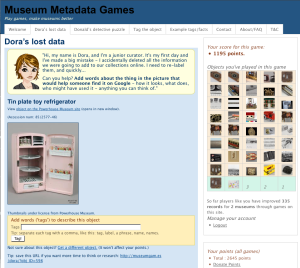Workshop abstract: Learning to play like a programmer: web mash-ups and scripting for beginners.
Slides (pdf): Play Like A Programmer workshop DH2012
Links for the Digital Humanities pre-conference workshop 'Learning to play like a programmer: Web mash-ups and scripting for beginners'
My contact details
Twitter: @mia_out, blog openobjects.org.uk, homepage miaridge.com
Text editors
- For older Macs: Smultron http://sourceforge.net/projects/smultron
- For newer Macs: Smultron http://www.peterborgapps.com/smultron or TextWrangler http://www.barebones.com/products/textwrangler
- For PCs: Notepad or WordPad will work but you can also try Notepad++ http://notepad-plus-plus.org
Online javascript console
Data to play with
- Find out more about the source datasets provided at documentation for collections data from Science Museum, National Media Museum, National Railway Museum (NMSI) as CSV and Cooper Hewitt collection data.
- If you prefer literature, try Project Gutenberg or the Internet Archive for source texts
- A long list of museum, gallery, library, archive, archaeology and cultural heritage (GLAM++) APIs, linked and open data services
Visualisation tools
- ManyEyes http://manyeyes.alphaworks.ibm.com/manyeyes/
- Google Fusion tables (tip: geo-code the data; needs someone to have a Google login)
- Voyeur Tools: great for text analysis
- Textalyser can be used to generate numeric data such as phrase frequencies (try using the outputs in other visualisation tools)
- Try entity extraction (e.g. on description fields) with Zemanta, dbpedia or Maui Indexer.
- Mr. Data Converter converts Excel data into one of several web-friendly formats, including HTML, JSON and XML
- http://selection.datavisualization.ch – inspiring examples including some libraries you can start playing with
- data-art.net – more examples for inspiration
- Bamboo DiRT is a tool, service, and collection registry of digital research tools for scholarly use
Resources to keep learning
- http://scratch.mit.edu – language designed for beginners
- http://www.codecademy.com – a different way of learning JavaScript
- http://www.w3schools.com/js – read and try new bits of JavaScript
About learning to code
- http://www.guardian.co.uk/info/developer-blog/2011/oct/07/programming-developer-journalist Seven things you should know if you're starting out programming
- Stephen Ramsay, Learning to Program http://lenz.unl.edu/2012/06/10/learning-to-program.html
On hack days
- Chris Heilmann on hack days http://www.slideshare.net/cheilmann/what-the-hack
- Discussion on broadening hack days http://museum-api.pbworks.com/w/page/40213729/Broadening%20hack%20days
Going further with debugging
- Advanced Debugging With JavaScript – from 2009 but a useful overview
- Using your browser to find errors http://siliconforks.com/doc/debugging-javascript/ (older page)
- Debugging JavaScript with Firebug http://getfirebug.com/javascript
- Great tool for checking JavaScript libraries with HTML and CSS http://jsfiddle.net

